#Democratic Alliance for the Betterment and Progress of Hong Kong
Text
Further reading:
HKFP: Hong Kong pulls more democracy books from library shelves citing security law concerns, May 10, 2021
HKFP: Hong Kong gov’t refuses to say which library books are banned under national security law, April 7, 2022
#hong kong#library#books#freedom of information#Leisure and Cultural Services Department#hong kong national security law#censorship#Lo Kin Hei#HK Democratic Party#Philip Li#Democratic Alliance for the Betterment and Progress of Hong Kong#Albert Ho#Tanya Chan#Yu Jie#Liao Yiwu#politics#Joshua Wong#HK Civic Party#Priscilla Leung#hong kong alliance in support of patriotic democratic movements of china#1989 tiananmen square protests#tiananmen square massacre#news#Hong Kong#hong kong free press
7 notes
·
View notes
Text
Monday, September 20, 2021
Biden’s Entire Presidential Agenda Rests on Expansive Spending Bill
(NYT) Biden’s entire presidential agenda is riding on the reconciliation bill being crafted in Congress right now. No president has ever packed as much of his agenda, domestic and foreign, into a single piece of legislation as President Biden has with the $3.5 trillion spending plan that Democrats are trying to wrangle through Congress over the next six weeks,” Tankersley writes. “It is almost as if President Franklin D. Roosevelt had stuffed his entire New Deal into one piece of legislation, or if President Lyndon B. Johnson had done the same with his Great Society, instead of pushing through individual components over several years. If he succeeds, Biden’s far-reaching attempt could result in a presidency-defining victory that delivers on a decades-long campaign by Democrats to expand the federal government to combat social problems and spread the gains of a growing economy to workers. If he fails, he could end up with nothing. As Democrats are increasingly seeing, the sheer weight of Mr. Biden’s progressive push could cause it to collapse, leaving the party empty-handed, with the president’s top priorities going unfulfilled. … If Mr. Biden’s party cannot find consensus on those issues and the bill dies, the president will have little immediate recourse to advance almost any of those priorities.
Child care in the US is a ‘broken market,’ Treasury report finds
(Yahoo Money) A Treasury Department report this week characterized the U.S. child care system as “unworkable” as Democrats push reform that experts say is an “overdue and critical investment.” The average American family with at least one child under age 5 uses 13% of their income to pay for child care, according to the report, nearly double the 7% that the U.S. Department of Health and Human Services considers affordable. Additionally, less than 20% of the children eligible for the Child Care and Development Fund—a federal assistance program for low-income families—are getting that funding. “Child care is a textbook example of a broken market, and one reason is that when you pay for it, the price does not account for all the positive things it confers on our society,” Treasury Secretary Janet Yellen said in a statement on Wednesday. “When we underinvest in child care, we forgo that; we give up a happier, healthier, more prosperous labor force in the future.”
Inspiration4 Astronauts Beam After Return From 3-Day Journey to Orbit
(NYT) After three days in orbit, a physician assistant, a community college professor, a data engineer and the billionaire who financed their trip arrived back on Earth, heralding a new era of space travel with a dramatic and successful Saturday evening landing in the Atlantic Ocean. The mission, which is known as Inspiration4, splashed down off the Florida coast at 7:06 p.m. on Saturday. Each step of the return unfolded on schedule, without problems. Within an hour, all four crew members walked out of the spacecraft, one at a time, each beaming with excitement as recovery crews assisted them.
Haitians on Texas border undeterred by US plan to expel them
(AP) Haitian migrants seeking to escape poverty, hunger and a feeling of hopelessness in their home country said they will not be deterred by U.S. plans to speedily send them back, as thousands of people remained encamped on the Texas border Saturday after crossing from Mexico. Scores of people waded back and forth across the Rio Grande on Saturday afternoon, re-entering Mexico to purchase water, food and diapers in Ciudad Acuña before returning to the Texas encampment under and near a bridge in the border city of Del Rio. Junior Jean, a 32-year-old man from Haiti, watched as people cautiously carried cases of water or bags of food through the knee-high river water. Jean said he lived on the streets in Chile the past four years, resigned to searching for food in garbage cans. “We are all looking for a better life,” he said.
Three Weeks After Hurricane Ida, Parts of Southeast Louisiana Are Still Dark
(NYT) For Tiffany Brown, the drive home from New Orleans begins as usual: She can see the lights on in the city’s central business district and people gathering in bars and restaurants. But as she drives west along Interstate 10, signs of Hurricane Ida’s destruction emerge. Trees with missing limbs fill the swamp on either side of the highway. With each passing mile, more blue tarps appear on rooftops, and more electric poles lay fallen by the road, some snapped in half. By the time Ms. Brown gets to her exit in Destrehan 30 minutes later, the lights illuminating the highway have disappeared, and another night of total darkness has fallen on her suburban subdivision. For Ms. Brown, who works as an office manager at a pediatric clinic, life at work can feel nearly normal. But at home, with no electricity, it is anything but. “I keep hoping every day that I’m going to go home and it’ll be on,” she said. Three weeks have passed since Hurricane Ida knocked down electric wires, poles and transmission towers serving more than one million people in southeast Louisiana. In New Orleans, power was almost entirely restored by Sept. 10, and businesses and schools have reopened. But outside the city, more than 100,000 customers were without lights through Sept. 13. As of Friday evening there were still about 38,000 customers without power, and many people remained displaced from damaged homes.
Favela centennial shows Brazil communities’ endurance
(AP) Dozens of children lined up at a community center in Sao Paulo for a slice of creamy, blue cake. None was celebrating a birthday; their poor neighborhood, the favela of Paraisopolis, was commemorating 100 years of existence. “People started coming (to the city) for construction jobs and settled in,” community leader Gilson Rodrigues said. “There was no planning, not even streets. People started growing crops. It was all disorganized. Authorities didn’t do much, so we learned to organize ourselves.” The favela’s centennial, which was marked on Thursday, underscores the permanence of its roots and of other communities like it, even as Brazilians in wealthier parts of town often view them as temporary and precarious. Favelas struggle to shed that stigma as they defy simple definition, not least because they evolved over decades. Paraisopolis is Sao Paulo’s second-biggest favela, home to 43,000 people, according to the most-recent census, in 2010. Recent, unofficial counts put its population around 100,000.
The barbecue king: British royals praise Philip’s deft touch
(AP) When Prince Philip died nearly six months ago at 99, the tributes poured in from far and wide, praising him for his supportive role at the side of Queen Elizabeth II over her near 70-year reign. Now, it has emerged that Philip had another crucial role within the royal family. He was the family’s barbecue king—perhaps testament to his Greek heritage. “He adored barbecuing and he turned that into an interesting art form,” his oldest son Prince Charles said in a BBC tribute program that will be broadcast on Wednesday. “And if I ever tried to do it he ... I could never get the fire to light or something ghastly, so (he’d say): ‘Go away!’” In excerpts of ‘Prince Philip: The Royal Family Remembers’ released late Saturday, members of the royal family spoke admiringly of the late Duke of Edinburgh’s barbecuing skills. “Every barbecue that I’ve ever been on, the Duke of Edinburgh has been there cooking,” said Prince William, Philip’s oldest grandson. “He’s definitely a dab hand at the barbecue ... I can safely say there’s never been a case of food poisoning in the family that’s attributed to the Duke of Edinburgh.” The program, which was filmed before and after Philip’s death on April 9, was originally conceived to mark his 100th birthday in June.
Relations between France and the U.S. have sunk to their lowest level in decades.
(NYT) The U.S. and Australia went to extraordinary lengths to keep Paris in the dark as they secretly negotiated a plan to build nuclear submarines, scuttling a defense contract worth at least $60 billion. President Emmanuel Macron of France was so enraged that he recalled the country’s ambassadors to both nations. Australia approached the new administration soon after President Biden’s inauguration. The conventionally powered French subs, the Australians feared, would be obsolete by the time they were delivered. The Biden administration, bent on containing China, saw the deal as a way to cement ties with a Pacific ally. But the unlikely winner is Britain, who played an early role in brokering the alliance. For its prime minister, Boris Johnson, who will meet this coming week with Biden at the White House and speak at the U.N., it is his first tangible victory in a campaign to make post-Brexit Britain a player on the global stage.
Hong Kong’s first ‘patriots-only’ election kicks off
(Reuters) Fewer than 5,000 Hong Kong people from mostly pro-establishment circles began voting on Sunday for candidates to an election committee, vetted as loyal to Beijing, who will pick the city’s next China-backed leader and some of its legislature. Pro-democracy candidates are nearly absent from Hong Kong’s first election since Beijing overhauled the city’s electoral system to ensure that “only patriots” rule China’s freest city. The election committee will select 40 seats in the revamped Legislative Council in December, and choose a chief executive in March. Changes to the political system are the latest in a string of moves—including a national security law that punishes anything Beijing deems as subversion, secession, terrorism or collusion with foreign forces—that have placed the international financial hub on an authoritarian path. Most prominent democratic activists and politicians are now in jail or have fled abroad.
The Remote-Control Killing Machine
(Politico/NYT) For 14 years, Israel wanted to kill Iran’s top nuclear scientist. Then they came up with a way to do it while using a trained sniper who was more than 1,000 miles away—and fired remotely. It was also the debut test of a high-tech, computerized sharpshooter kitted out with artificial intelligence and multiple-camera eyes, operated via satellite and capable of firing 600 rounds a minute. The souped-up, remote-controlled machine gun now joins the combat drone in the arsenal of high-tech weapons for remote targeted killing. But unlike a drone, the robotic machine gun draws no attention in the sky, where a drone could be shot down, and can be situated anywhere, qualities likely to reshape the worlds of security and espionage.
Israeli army arrests last 2 of 6 Palestinian prison escapees
(AP) Israeli forces on Sunday arrested the last two of six Palestinian prisoners who escaped a maximum-security Israeli prison two weeks ago, closing an intense, embarrassing episode that exposed deep security flaws in Israel and turned the fugitives into Palestinian heroes. The Israeli military said the two men surrendered in Jenin, their hometown in the occupied West Bank, after they were surrounded at a hideout that had been located with the help of “accurate intelligence.” The prisoners all managed to tunnel out of a maximum-security prison in northern Israel on Sept. 6. The bold escape dominated newscasts for days and sparked heavy criticism of Israel’s prison service. According to various reports, the men dug a hole in the floor of their shared cell undetected over several months and managed to slip past a sleeping prison guard after emerging through a hole outside the facility. Palestinians in the West Bank and Gaza Strip have celebrated the escape and held demonstrations in support of the prisoners. Taking part in attacks against the Israeli military or even civilians is a source of pride for many Palestinians, who view it as legitimate resistance to military occupation.
Jaw-dropping moments in WSJ's bombshell Facebook investigation
(CNN Business) This week the Wall Street Journal released a series of scathing articles about Facebook, citing leaked internal documents that detail in remarkably frank terms how the company is not only well aware of its platforms’ negative effects on users but also how it has repeatedly failed to address them. Here are some of the more jaw-dropping moments from the Journal’s series. In the Journal’s report on Instagram’s impact on teens, it cites Facebook’s own researchers’ slide deck, stating the app harms mental health. “We make body image issues worse for one in three teen girls,” said one slide from 2019, according to the WSJ. Another reads: “Teens blame Instagram for increases in the rate of anxiety and depression ... This reaction was unprompted and consistent across all groups.” In 2018, Facebook CEO Mark Zuckerberg said a change in Facebook’s algorithm was intended to improve interactions among friends and family and reduce the amount of professionally produced content in their feeds. But according to the documents published by the Journal, staffers warned the change was having the opposite effect: Facebook was becoming an angrier place. A team of data scientists put it bluntly: “Misinformation, toxicity and violent content are inordinately prevalent among reshares,” they said, according to the Journal’s report.
3 notes
·
View notes
Text
Hong Kong elections: overconfident Beijing loyalist parties suffer a near-total rout
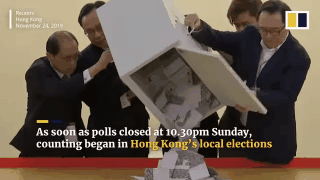
Last week's local elections in Hong Kong were supposed to be a pro-forma affair, reaffirming the dominance of pro-Beijing "loyalist" politicians; instead, pro-democracy parties swept every district save one -- the rural Islands district, where seats are automatically handed to "pro-establishment rural chiefs."
The election saw record turnouts -- so many first-time young voters cast ballots that incumbents who increased the number of votes they received still lost because new voters cast ballots against them, and in favor of pro-democracy parties. More than a million new voters registered for this election, and it saw a 71% turnout of registered voters (only 47% voted in 2015).
Despite the surge of younger voters, the pro-democracy victories are owed to a flood of pro-democracy votes in every kind of poll: "in poor and rich neighbourhoods, in both protest-prone and non-protest-afflicted districts and, in downtown areas as well as the suburbs." The ballots were hand-marked on paper and counted in public.
The results come as a shock to Beijing. The Chinese state had been so certain of a victory that it had already prepared news-stories about it. While it's fun to imagine the frustration of the officials who directed the brutal crackdown on protesters in Hong Kong, it's sobering to recall that the Chinese state's most brutal crackdowns have historically followed on from surprises in which senior officials' most cherished initiatives failed.
The politicians swept to victory include numerous young protest leaders, including five or more Occupy activists and people closely associated with the Hong Kong protests that started last spring.
The Hang-Seng stock index rose on the news; investors may be imagining that the electoral victory will end the protests as the program of political reform moves from the streets into the council chamber.
Out of 452 total seats, pro-democracy parties took 347 (77%), independents (who typically lean pro-democracy) took 45 (10%), and establishment, pro-Beijing parties won 60 seats (13%), down from 292 (!). The Democratic Alliance for the Betterment and Progress of Hong Kong, the city's largest pro-establishment party, went from 119 seats to 21.
The change in local governments means that beleaguered city executive Carrie Lam will struggle to get her agenda through council and will find her situation even more precarious -- already, pro-Beijing politicians who lost their seat are blaming Lam's mishandling of the political situation for their rout. Lam promised to "listen to the opinions of members of the public humbly and seriously reflect."
https://boingboing.net/2019/11/25/from-292-seats-to-60.html
68 notes
·
View notes
Link
Ethnic tensions are coming to the fore, but many minorities find solidarity with activists.
Jessie Lau
November 7, 2019, 4:53 PM
A man waves an Indian flag near Chungking Mansions, a popular haunt among minority South Asians and Africans in Hong Kong, as police keep watch at a crosswalk during a pro-democracy rally in Tsim Sha Tsui district on Oct. 27. Philip Fong/AFP via Getty Images
HONG KONG—For Zab, Hong Kong has always been home. While the 25-year-old has roots in Pakistan, he was born, raised, educated, and now works in the city. This summer, Zab—who gave only his last name out of safety concerns—has been a cautious participant in several Hong Kong protests, standing out as one of the few brown faces among the protesters. After tear gas was fired during one rally, he ran into a police blockade as he attempted to flee. Trapped and struggling to breathe, he was terrified of being interrogated. But the police let him pass—a decision Zab suspects was related to his Pakistani ethnicity. “They probably thought I wasn’t a Hong Kong person,” he said.
This year’s protests are bringing Hong Kong’s ethnic tensions to the fore. After a mob assaulted commuters in Yuen Long train station in July, Nepali men in the neighborhood were abused by locals and accused of attacking civilians. Hong Kong’s railway corporation came under fire for reportedly planning a task force of former Gurkhas to enforce bylaws during the crisis because, in the words of a railway executive, “Nepalese do not understand Cantonese, [and] thus they will be less provoked.” Last month, when an assault on the pro-democracy leader Jimmy Sham left him lying in a pool of his own blood, local media claimed his attackers were South Asian without evidence.
Minority leaders rushed to publicly condemn the violence and support Sham—as well as privately urge community members to lie low in case of retaliations. Most recently, after police doused a mosque using water cannons with blue dye to clear a peaceful protest supporting ethnic minorities, demonstrators helped clean the mess and rallied around the community. In a moving show of solidarity, they organized a Thanksgiving gathering at Chungking Mansions, a local hub for ethnic minority workers and asylum-seekers.
Hong Kong’s identity crisis has been exacerbated in recent years. China’s authoritarian interventions have triggered a localist movement and imagined political community that sees itself as culturally, linguistically, and ideologically separate from mainland China. Since Hong Kong was handed to China by the British in 1997, those who identify as Hong Kongers grew from 35.9 percent to a record 52.9 percent this year, according to statistics from the University of Hong Kong’s Public Opinion Programme. Among locals aged 18 to 29, the percentage jumped from 45.6 percent to 75 percent. The trend holds true for ethnic minority families. Older generations are more conservative and wary of politics, Zab explained. “Our families say we are minorities here and don’t have a say. [But] I consider myself a Hong Konger,” Zab said.
Ethnic minorities such as Zab have historically been either tokenized as a symbol of diversity or demonized as scapegoats for Hong Kong’s social problems. But in the current movement, they have become a powerful marker of inclusion—especially in contrast to an increasingly ethnonationalist China, where minority groups are facing linguistic exclusion and mass detention camps.
In Hong Kong, ethnic minorities are defined by the government as people of non-Chinese ethnicity. Yet only those who do not pass as white or Chinese are considered second-class citizens by mainstream society. In 2016, excluding foreign domestic workers, 263,593 people in Hong Kong—3.6 percent of the population—fell into this group. In contrast to the generally aging population and falling birth rate, between 2006 and 2016, the number of ethnic minorities aged 15 to 24 more than doubled, and those born in Hong Kong increased from 24.5 percent to 30.9 percent.
Hong Kong has always been multicultural—not just English and Chinese but an imperial outpost drawing its population from across the British Empire. The South Asian community can be traced to the 1840s, when it defended Hong Kong as soldiers and worked alongside Eurasians as intermediaries between Chinese and Europeans. More than 1,000 Indian soldiers were killed or injured while protecting Hong Kong in the 1941 Japanese invasion. Star Ferry, Hong Kong’s main passenger ferry service, was founded by an Indian Parsi baker.
The British made heavy use of Gurkha soldiers, who helped suppress the 1900 Boxer Rebellion and established today’s Nepali community. Following World War II, inexpensive laborers from the Philippines and other Southeast Asian countries began migrating to Hong Kong to work as foreign domestic workers, supporting an emerging Chinese middle class. In the 1970s, Vietnamese refugees joined them.
Despite such crucial contributions, ethnic minorities remain systematically marginalized. Entrenched language barriers, racial profiling, and poverty remain barriers to integration. Many have long condemned the government’s failure to teach local languages to non-Chinese speakers. Until 2004, children who lacked Chinese proficiency but could not afford international schools were directed toward government institutions targeting working-class minorities, which came with social stigma. Local media and conservative groups characterized them as criminals during a sweeping anti-refugee campaignblaming asylum-seekers for stretching local resources.
While such students can now apply to other institutions, schools have independent selection criteria and are not required to provide specialized curriculum for language proficiency. A 2016 study found that less than 20 percent of jobs advertised online catered to non-Chinese speakers. Nearly one-fifth of ethnic minorities also live below the poverty line, and the poverty rate rose from 15.8 percent to 19.4 percent between 2011 and 2016.
The protest movement is hardly free of discrimination itself. When the anti-extradition protests first erupted, 29-year-old Yasir Naveed, who proudly identifies as a Hong Konger, was galvanized. Donning a white shirt with the rest of the crowd, he marched in the first rally with his 72-year-old father and 4-year-old nephew—a move to express multigenerational support. “My father is part of the senior citizens who built this city,” said Naveed, who is ethnically Pakistani. “And the future is our nephew.”
Fixing the crisis will be risky—but worthwhile for both sides.
Early on, there were already rumors that ethnic minorities were being hired to attack protesters. One day, Naveed received a message from Han Chinese protesters asking him to check the grammar on an Urdu text. It was an appeal from demonstrators asking ethnic minorities not to “accept bribes” to “beat up” protesters. Naveed was stunned. “I was so offended,” he said. He responded saying the message was grammatically correct but ethically wrong. “Did they think we are sellouts? That we’re so hungry and needy for money that a party can buy us?”
The simultaneous co-option and rejection of minorities also occurred in the 2014 Umbrella Movement and 2012 anti-national education protests. Minorities were celebrated by protesters as proof of local inclusion, but their interests were subsumed during broader political discussions, which were largely publicized and conducted solely through Cantonese, with excursions into Mandarin.
Paul O’Connor of Lingnan University called the treatment of ethnic minorities a missed opportunity. “They hold true opportunity for Hong Kong to redistinguish itself as this ‘one country, two systems’ territory because China doesn’t have the history that Hong Kong has in terms of this multicultural heritage,” O’Connor said. “Instead, their interests are being co-opted by the broader fight about Hong Kong identity and then dropped.”
In fact, Raees Baig, an assistant professor of social work at the Chinese University of Hong Kong, said pro-Beijing parties such as the Democratic Alliance for the Betterment and Progress of Hong Kong have more successfully engaged and advocated for ethnic minorities, through establishing outreach centers and English-language materials about government services.
That has left many community leaders carefully neutral. Adeel Malik, the chairperson of the Muslim Council of Hong Kong, exercised caution at present. He strongly condemned the recent violence by all parties, which he said has caused some to consider leaving Hong Kong. “If any of our community members get involved and anything turns into a riot, sadly it can be easy to stereotype the whole community,” Malik said. Arief Wahyudi, a 49-year-old local of Indonesian descent who has lived in Hong Kong for two decades, echoed his sentiments. “Violence will only fuel violence,” he said. “That’s what we’re very scared of.”
Yet there’s no denying that the current movement has brought solidarity among different Hong Kongers on a previously unseen scale—albeit somewhat accidentally. Unlike other protest movements, it has effectively used creative and grassroots messaging to target a global audience—inadvertently extending accessibility to local non-Chinese speakers, said Puja Kapai of the University of Hong Kong.
Many people have been empowered by expressions of unity and have experienced political awakenings for the first time. Han Chinese locals are also becoming more aware of the ethnic minority communities. A local journalist of Pakistani descent became a protest icon after fiercely cross-examininggovernment officials in fluent Cantonese. Various ethnic minority protesters have also been embraced as Hong Kongers. “There have been blessings in disguise,” Malik said.
Jeffrey Andrews, a local social worker of Indian descent who organized the Thanksgiving gathering at Chungking Mansions, said many of the Han Chinese guests had never mingled with ethnic minorities before. “For the very first time, we’ve taken ownership,” he said. “We’ve taken a crisis and turned it into an opportunity.”
As the protests spiral into their 22nd week, Zab’s family and friends have warned him against becoming more involved in the crisis. But in Zab’s eyes, the movement has already entangled Hong Kong’s ethnic minorities, whether they like it or not. “If we consider ourselves as part of Hong Kong, we should be involved in political affairs,” said Zab, who is thinking of running for district council in the future. “We can’t just stay behind the scenes.”
Jessie Lau is a journalist in Hong Kong.
15 notes
·
View notes
Photo

"DAB (Democratic Alliance for the Betterment and Progress of Hong Kong) = Disgrace = Communist Party" in Sau Kei Wan. #Repost from @creativehkpeople. . #民建聯 #反送中 #hongkongprotests #HKStreetArt #stencil #protestart #politicalart #fuckdabhk #ccp #hkgraffiti #discoverhongkong #carrielam #reginaip #dabhk — view on Instagram https://ift.tt/35zoabA
1 note
·
View note
Text
Hong Kong’s biggest pro-establishment party to propose measures at top state meetings for residents to manage cross-border affairs
Hong Kong’s biggest pro-establishment party to propose measures at top state meetings for residents to manage cross-border affairs
Hong Kong’s biggest pro-establishment party has said it would urge mainland Chinese officials at the country’s two most important annual conferences to establish remote channels for local residents to manage cross-border affairs amid the city’s Covid-19 crisis.Delegates from the Democratic Alliance for the Betterment and Progress of Hong Kong (DAB) said on Wednesday that the proposal was one of…
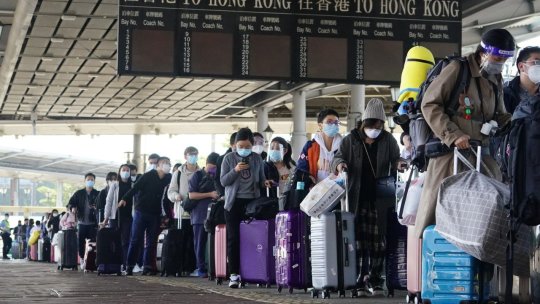
View On WordPress
0 notes
Text
Survey: Residents more upbeat about HKs economic prospects #SootinClaimon.Com
#SootinClaimon.Com : ขอบคุณแหล่งข้อมูล : หนังสือพิมพ์ The Nation.
https://www.nationthailand.com/international/40004502
Survey: Residents more upbeat about HKs economic prospects
HONG KONG – Hong Kong residents are becoming more optimistic about the city’s economic development prospects, a survey conducted by the Democratic Alliance for the Betterment and Progress of Hong Kong…
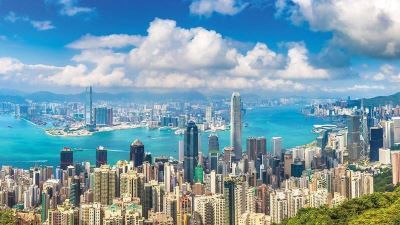
View On WordPress
0 notes
Text
'Democratic alliance' Degrades West's Politics, Advocates US Hegemony: Global Times editorial
Global Times | May 10, 2021
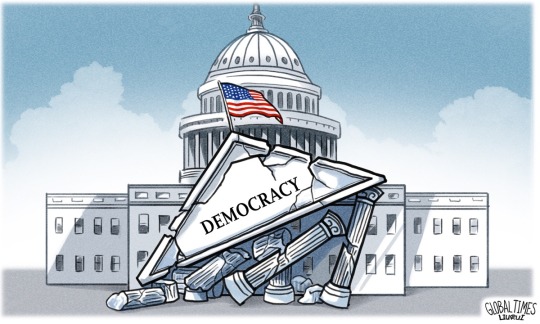
Crumbling US democracy. Illustration: Liu Rui/GT
The Copenhagen Democracy Summit 2021, hosted by the Alliance of Democracies Foundation in Denmark, is scheduled on Monday and Tuesday. The summit again invited the Taiwan regional leader and Hong Kong secessionists via video, in an attempt to stir more confrontations.
During the so-called democracy summit last year, then US secretary of state Mike Pompeo made an extremely vicious attack on the Communist Party of China (CPC) through a video speech. The Alliance of Democracies Foundation was established in 2017 by former NATO secretary general and former Danish prime minister Anders Fogh Rasmussen. The foundation was sanctioned by the Chinese government in March.
There is a group of "democratic fundamentalists" in the West today. They are hysterically hostile to China's rise and morbidly describe the world today as a confrontation between democracy and autocracy, inciting a sense of crisis in Western society. They have betrayed the basic principle of democracy which is fairness and justice, and they are obsessed with the fanatical pursuit of "Western superiority" and "Western privilege." They are sharply opposed to the reality of this era.

Conference for 'democracy' inviting Taiwan, HK separatists looks like 'alliance of losers'. — Yang Sheng
The biggest challenge to the governance of all countries, including China, is how to meet people's needs for a better life. The success of China's current system lies in its ability to focus more on this mission and to develop fast enough. This is the essence of Chinese politics. Western forces involved in the "democratic alliance" have deliberately put geopolitical tags on different countries' development and competition, describing it as confrontation between different systems. Their perception twists facts, calling white black.
The essence of containing China's rise is to deprive 1.4 billion Chinese people of their right to further improve their destiny and live a better life. China is not empty. The country is composed of individuals and families who need higher-income jobs, better welfare guarantees and ecological environment and more confidence in security. All of this needs to be supported by economic development as well as technological progress.
Human society in the 21st century should be able to coordinate all countries' development in a democratic manner, in accordance with the rules of the UN Charter. We should also prevent this issue from returning to a geopolitical dead end or creating a new round of world division and confrontation.

Chinese FM slams Copenhagen 'democracy summit' as political farce. — Chinese Foreign Ministry spokesperson Hua Chunying.
The so-called "democracy conference" held in Copenhagen, hosted by an organization known for spreading rumors and lies about China, is "a downright political farce" filled with ideological prejudices, Chinese Foreign Ministry spokesperson Hua Chunying said on Tuesday.
However, this so-called democracy summit runs counter to the progress of the times. It openly advocates creating a new "alliance," calls on "democratic states" to be loyal to the US and collude against China and Russia. This is to turn back the wheel of history and drag the world back into darkness again.
The Danish Alliance of Democracies Foundation has no democratic spirit at all. It is a lapdog of the US. We can't help but say that this is a degradation of the Western political environment in which democracy can be carried out under the banner of advocating American hegemony.
The "summit" invited a series of infamous persons, including the leader of the secessionist authority in China's Taiwan island, a fugitive separatist from Hong Kong, and other "democratic activists" Worldwide
Starting in the US, it is popular among Western countries to clamor for "democracy" and try to show some kind of solemnity. This is very ridiculous. In terms of development, Western democracy has shown its weakness in competitiveness, and reform should have been its way to make up for the weakness. But instead, Western countries are angrily accusing China of being "undemocratic," as if their problems are all caused by China. This is like Western countries are having diarrhea and are forcing China to take medicine.
The Western-style democratic system has been running for a long time, and aging is normal. It is a pity that the system has produced such a group of leading but good-for-nothing elites. They do not want to seriously promote reforms and are best at passing the buck. They also try hard to form small circles, desperately trying to justify each other's wrong moves and ideas. History will laugh at those incompetent people who hype "democratic alliance" in the 21st century.
0 notes
Link
In Hong Kong, a New Occasion Requires Stability (and Raises Suspicions) BEIJING — They’re businessmen, born in mainland China, who serve on prime advisory committees to Beijing and profess patriotism for the motherland. One not too long ago traveled to an obscure village in southeastern China to review Xi Jinping’s doctrine for guiding the nation to greatness. Now, they’re looking for to carry that ardor to Hong Kong, because the founders of town’s latest political celebration. They’re calling for social stability to unify a deeply fractured society and mend a broken economic system. “You can not have a protest each day,” mentioned Li Shan, the founder and chairman of the celebration. The arrival of the Bauhinia Occasion has fueled livid hypothesis about the way forward for Hong Kong’s once-vibrant, at instances unruly, political scene. The celebration, led by enterprise executives who moved to Hong Kong from the mainland, is getting into the fray amid forceful strikes by the Chinese language authorities to quash dissent, after large pro-democracy protests in 2019 challenged its rule. Already, the authorities have ejected opposition lawmakers from the Hong Kong legislature and disqualified and arrested would-be candidates. Many within the pro-democracy camp see the brand new celebration as one more signal that Hong Kong — a former British colony that was promised 50 years of semi-autonomy when it returned to China in 1997 — is changing into simply one other mainland metropolis. However the information was equally, if no more, unsettling for Hong Kong’s pro-Beijing bloc, the coalition of native enterprise tycoons, established politicians and commerce unions that has lengthy been allowed to control because the central authorities’s proxy. Many have questioned if the emergence of the brand new celebration is Beijing’s sign that it has much less use for these conventional energy brokers and should substitute them with figures deemed more practical or reliable. Whereas the pro-Beijing camp has at all times professed loyalty to the central authorities, its members have taken care to emphasise the variations between their metropolis and the mainland. The Bauhinia Occasion seems to offer itself to Beijing as a brand new mannequin for allies, ones who’re extra overt about their ties to the central authorities and their admiration for its top-down method. Mr. Li is a delegate to the nationwide Chinese language Folks’s Political Consultative Convention, an advisory physique to Beijing, and speaks hardly any Cantonese, Hong Kong’s native language. One other co-founder, Chen Jianwen, is a delegate to a regional arm of the advisory physique and leads an affiliation for alumni of a coaching academy for Communist Occasion officers. Central planks of the celebration’s platform embrace combating discrimination towards mainland transplants to Hong Kong and fostering a love of Chinese language language and tradition. Mr. Li mentioned he desires to encourage extra Hong Kong college students to review at mainland universities and bear “patriotic training,” an echo of Mr. Xi’s personal requires younger Hong Kongers to “improve their sense of belonging to the motherland.” Even the best way Mr. Li established the celebration nodded to the central authorities. He formally based it aboard a cruise ship in Hong Kong’s Victoria Harbor, a reference to Mao Zedong’s founding of the Chinese language Communist Occasion aboard a ship in japanese China, in line with celebration lore. Perceived allegiance to Beijing could possibly be a very powerful issue for securing the central authorities’ blessing within the coming years, mentioned Willy Lam, a professor of Chinese language politics on the Chinese language College of Hong Kong. If extra individuals with mainland backgrounds participated in Hong Kong politics, Beijing might “relaxation assured” that town could be led by those that “would presumably be extra loyal to the motherland,” he added. The Bauhinia Occasion’s founders deny that they’re puppets of Beijing or that they search to supplant current events. Mr. Li mentioned the celebration is targeted on the number of town’s chief government, not on successful legislative seats. The chief government is chosen by a committee of simply 1,200 electors, many with shut ties to Beijing. Whereas Mr. Li mentioned he was not planning to run in subsequent yr’s chief government race, he hinted repeatedly that he was within the job sometime. “If the neighborhood requires me to commit myself for such a job or duty, I’m keen to sacrifice myself,” he mentioned in an interview in Beijing final month. Mr. Li mentioned he didn’t inform the central or Hong Kong authorities that he was beginning a celebration till after he had completed so. Then he notified Hong Kong’s chief government, Carrie Lam, and the Central Liaison Workplace, Beijing’s official arm in Hong Kong. He bristled at strategies that he was an outsider. “I’ve been a everlasting resident for 20 years,” mentioned Mr. Li, a financier who moved to Hong Kong in 1993 after finishing a doctorate on the Massachusetts Institute of Know-how. The co-founders say they need to attain opponents of the federal government in addition to supporters. In its acknowledged rules, the celebration professes a dedication to common suffrage — a central demand of the pro-democracy camp — and a promise to make Hong Kong “one of many world’s most free, democratic and open” cities. Mr. Li mentioned he desires to protect the construction of “one nation, two techniques,” for a further 50 years. However the pro-democracy camp has dismissed these overtures as lip service. An editorial in Apple Each day, a fervently pro-democracy newspaper, referred to as the celebration a “Computer virus” that will enable the Communist Occasion to function brazenly in Hong Kong. Lo Kin-hei, the chairman of the Democratic Occasion, wrote on Twitter that it was the “Hong Kong department” of the Communist Occasion. The professional-Beijing camp has been equally hostile. Many have sneered on the Bauhinia Occasion’s acknowledged aim of attracting 250,000 members, about 5 instances greater than the most important pro-Beijing celebration in Hong Kong has. Mr. Li mentioned on Friday that the celebration had fewer than 100 members thus far. “It’s straightforward to start out a celebration, however it isn’t that straightforward to determine your celebration as a viable political power,” mentioned Jasper Tsang, the founding father of that largest celebration, the Democratic Alliance for the Betterment and Progress of Hong Kong. Mr. Tsang dismissed the concept that the Bauhinia Occasion had Beijing’s backing or that Mr. Li might turn into chief government. He identified that Hong Kong’s two main state-backed newspapers had paid little consideration to the brand new celebration, which he mentioned recommended an absence of official help. Regina Ip, the founding father of one other pro-Beijing celebration, mentioned Mr. Li had approached her about doable collaboration and that she was “not in any manner .” “I don’t assume he begins to grasp how advanced the job is,” she mentioned of Mr. Li’s hints about operating for chief government. “When you’ve got some monetary credentials, it doesn’t imply you’re certified.” Mr. Li acknowledged that he was not fluent in Hong Kong politics, regardless of his lengthy residence within the metropolis. He mentioned he had by no means voted till late 2019. Requested about his place on a contentious proposal to permit Hong Kong residents residing in mainland China to vote within the metropolis’s elections, he mentioned he had not heard of the difficulty. Some have been extra amenable to the Bauhinia Occasion. Christine Loh, a former pro-democracy lawmaker who additionally labored within the administration of a pro-Beijing chief government, mentioned she didn’t know a lot concerning the new celebration. However she mentioned that Hong Kongers needs to be extra open to political figures extra aligned with the mainland system. “It isn’t that it’s going to be prolonged to Hong Kong, but it surely’s not completely unconnected,” she mentioned of the mainland system. It’s doable, she mentioned, that individuals with ties to it’d be capable to assist Hong Kong. Whereas Mr. Li insists that he didn’t seek the advice of any Chinese language officers earlier than establishing his celebration, he acknowledged discussing a few of its proposals with officers since then. Final month, he visited a museum in Xiadang, a village the place Mr. Xi labored as a younger Communist Occasion cadre within the Nineteen Eighties. Mr. Li mentioned he needed to study extra concerning the early growth of “Xi Jinping Thought,” Mr. Xi’s ideological manifesto. One other co-founder, Wong Chau-chi, demurred in an interview with The South China Morning Put up when requested whether or not Bauhinia Occasion members have been secretly Communist Occasion members. “It’s not right to guage our celebration on whether or not we have now underground members or not,” he mentioned. “It’s one thing not related to our governance.” Supply hyperlink #Calls #Hong #Kong #party #raises #stability #suspicions
0 notes
Text
For Japan and South Korea, what next?
In Peak Japan, Brad Glosserman shows why Japan has been unable to break out of the torpor that began in the early 1990s and continues to this day, providing critical insight into its political system and culture. Glosserman was recently interviewed for the Seoul Economic Daily in Korea about the impact of Covid-19 in Japan, the South-Korea-Japan relationship, and what steps the South Korean government should take in its foreign policy in light of what’s going on internationally. The interview has been translated and lightly edited for clarity.
Can you say a bit about the impact of Covid-19 in Japan?
Japan’s response to the COVID outbreak has been schizophrenic. On one hand, the grayest country on earth should be rightly concerned about a pandemic that hits the elderly especially hard. On the other hand, the government’s power is limited–unlike the ROK, forced lockdowns are not possible. Thus, citizens assume special responsibility for their decisions. A generational split in that response (young people have been out and about while the elderly seem more restrained) has been compounded by tension seen around the world between those who prioritize health and those who worry about the economic toll. That has been exacerbated in Japan by economic difficulties that predated the COVID outbreak–the Japanese economy had already contracted before it began–and geopolitics, in particular relations with China. Xi Jinping was supposed to make a state visit in April and its postponement and possible cancellation has clouded efforts by the Abe government to improve relations with China. The attitude toward China has hardened since then due to a variety of factors–Hong Kong, continued incursions in territorial waters, and more aggressive foreign policy in general.
As I write, COVID cases in Japan are increasing; I can’t say spiking because they continue to grow. The Japanese knew that they had avoided the worst of the outbreak in the first wave, but they didn’t know why. They still don’t. Their economy is in trouble, China is being more aggressive and assertive, the US is acting more and more oddly, and Japanese political leadership appears to be weakening. In other words, all trends identified in Peak Japan are intensifying.
It seems the postponement of the Tokyo Olympics is having a particular impact on those living in Fukushima and the surrounding area. Do you foresee that this will have an effect on the popularity of Abe’s party (the Liberal Democratic Party)?
Soon? No. Abe is definitely weakened, however. That reflects the reassertion of bad habits and the sclerosis of a one-party system. Politicians and bureaucrats have settled back into old ways of doing things and that is not good for the country. Abe’s tenure has been marked by the consolidation of power in the Prime Minister’s Office. It will be very interesting to see how the political world reacts to weakness there and how the leadership vacuum is filled. The first signs of that cracking in authority are evident.
The problem is that there really isn’t a good alternative to Abe within his party or from across the aisle. Approval ratings for the Cabinet have been falling but the Japanese public does not trust the opposition. The DPJ split and is no longer the leading opposition party; that position is now filled by the Democratic Constitutional Party of Japan, and its distinct identity from the LDP is unclear. This is often the case in Japanese politics. In Peak Japan, I noted that perhaps what most outraged the LDP was DPJ success at pushing through parts of the LDP agenda. So, no, the opposition has not matured. Nor for that matter has the Japanese voting public.
The key question is when Abe will leave office. There isn’t interparty agreement on who should succeed him and my guess is that Abe wants to hang on until the 2021 Olympics. But there are so many uncertainties between now and then that it is hard to anticipate how things will unfold.
You have repeatedly emphasized the need for South Korea and Japan to cooperate, not only in the book but also in the several talks, papers, and debates. Unfortunately, the relationship between these two countries is continually worsening, considering the historical, economic (e.g., whitelist removal, export regulations), and military conflicts (e.g., GSOMIA). Furthermore, Japan openly opposes South Korea joining G7. Do you still believe these two countries can cooperate? If so, what would you consider to be the first step?
Yes, I still believe they can cooperate but that it would require political leadership that understands national priorities and interests and puts those above the political interests of particular leaders. The first step would be resolving the trade dispute. The opening of a WTO case is a way to make progress. And since the WTO dispute resolution mechanism is currently broken the dispute cannot be resolved immediately, which buys the two countries time.
The problem, as repeatedly noted in those “talks, papers, and debates” is the utter lack of trust between the two governments. That must be rebuilt–but neither side trusts the other or believes that its partner wants to resolve the larger suite of issues that keeps them apart. South Koreans believe that Japan wants to keep them down and ignore the past, while Japanese believe that the ROK wants to maintain the moral high ground and keep them on the defensive. Japan wants Moon to make a political decision to promote better relations, and the only way they will be convinced of his sincerity is if he pays a political price for such a move. As I have suggested, if Moon were to say that “he accepts the Supreme Court decisions on forced labor but believes that it is South Korea’s national interest not to enforce them,” then that could lay the foundation for progress. Japan could find a face-saving solution to the problem.
The point of regional security cooperation between South Korea, the US, and Japan is the strategy of response to China and North Korea. The official reason for Japan’s opposition to accepting South Korea as a member of G7, which President Trump suggested, is that ‘there is a difference in ideologies between South Korea and the other member states of G7 on how to respond to China and North Korea.’ What’s your opinion on this position? And what is your opinion regarding South Korea’s diplomatic action as it relates to China and North Korea?
There are two issues here. The first is expansion of the G7, which really isn’t on the table. The G7 is outdated and needs a new raison d’etre. The proposal for a D10 makes some sense but a lot depends on details that are not forthcoming. Any organization of advanced economies with liberal democratic foundations that doesn’t include the ROK isn’t worthy of the name. South Korea must be a member of such a group, but that begs the question of what the group is for and what it will do. Seoul will likely not be the only ‘difficult’ government in such a grouping.
The second question has to do with a general understanding of South Korea’s security policy. I have written a good bit about this with Paul Choi–there is a recent article in The Diplomat. Our argument is that few really get Seoul’s thinking. Caricature tends to prevail, rather than an appreciation of the sophistication of ROK policy. We have all learned the wrong lessons from the THAAD episode. We need to reassess that incident and geopolitical dynamics generally to get policy and possibilities right.
It has been a while since the absolute hegemony of the US was weakened due to the steep rise of China. Many experts refer to the relationship between these two countries as a ‘Tuchididdes Trap.’ It has made the security dynamics in East North Asia more complicated. And the US-China conflicts and the East North Asia conflicts in turn frame the foreign policy of the Middle East. In this situation, what do you think is the most effective diplomatic policy Korea can consider?
I believe that Seoul’s best interest lies in continued alliance with the US, despite the fact that President Trump makes that difficult to see and even harder to pursue. I also believe that closer ties with Japan are vital and a strong Seoul-Tokyo axis could give both countries more leverage with the US. The most important thing though is for the South Korean people to quit thinking of themselves as “shrimps among whales,” and to believe that they have more agency in foreign affairs and should be more creative in their foreign policy.
You said, “The flying geese view is an obstruction for the Japanese in considering how to prepare for Japan’s future development.” However, last year, Japan imposed economic retaliation against Korea, excluding major export items from the whitelist. Do you think Japan's strategy worked for Japan?
No. Japan is trying to figure out how to practice better national economic statecraft and has reorganized its government bureaucracy to do so. The decision viz-a-viz the ROK on those three products was wrong-headed. There may well have been national security concerns–Japan wasn’t totally off base in having worries–but its response was shortsighted, emotional, and ultimately a self-inflicted wound.
Rumors of the withdrawal of U.S. troops from South Korea have been circulating, and I don't think it's just simple pressure to increase defense cost sharing. What do you think of the possibility of withdrawal of U.S. troops from South Korea?
That would be a mistake. The issue of burden sharing is now part of every US alliance around the world. Its salience predates the Trump administration but Trump has the most narrow and mistaken understanding of how alliances work and the advantages they provide to the US. There must be a recalibration of roles, missions, and responsibilities among the US and its security partners but that will demand a new understanding of how alliances work. The US has been very slow to do that. Allies are going to have to convince the US public that they believe in mutual responsibilities and shared missions. Often when I talk to allied governments, they urge the US to make the case for the alliance to their publics, as if that wasn’t their job. Not only is that not the case, but they are going to have to do more to sell the alliance to the US public as well. We all must become engaged in doing the PR work for these security partnerships.
As you say in the book, Japan is at its peak and already facing the problems that countries all around the world will soon be facing. Japan is trying to find a solution to problems like aging, low growth, and low consumption. What do you think Korean government should take away from the Japanese government's efforts on such issues?
Learn from Japan’s mistakes. Don’t be too insular, don’t put off dealing with trends that are already visible and problems that are likely inevitable but not here yet. Don’t get too comfortable. Don’t get cocky. Accept uncertainty, the need to constantly challenge yourselves and acknowledge that the world is changing faster than you think and all your assumptions will likely soon be upended. Openness–in virtually every sense–is key. Tinkering is unlikely to solve structural problems.
You say in the book that Japanese people are focused on becoming a mature country. However, the major conservative forces such as the Nippon Kaigi (Japan Conference) and Prime Minister Abe have different ideas. What do you think of the reality of Japan's addition of military capability through the revision of the pacifist constitution?
Japan is a small ‘c’ conservative country. Most Japanese don’t buy into the nationalism of Nippon Kaigi or the hard right. They want recognition for their contributions and the good things they have done, prefer not to dwell on–that is NOT the same as ‘erase’–the past, and mostly want to be left alone since they see a hostile world surrounding them. They know they are vulnerable and they fear that the changes that they must make to adjust to that world will not necessarily make their lives better. After all, who knows what the future will bring? The key message of Peak Japan is that in the absence of certainty about a better future after they make changes in their country, the Japanese will stick with the comfortable situation they are in.
The military piece of this is simple: The Japanese want to be left alone. They are pursuing military capabilities to better defend themselves and be a better ally. Not to threaten anyone else. For some Japanese, improved capabilities are intended to allow them to better contribute to international society, to give back what they have gained from the contributions of others. But that is not a universal sentiment. More popular is a belief that the country should not do anything that risks entanglement in foreign controversy or conflict.
Last question: recently John Bolton’s memoir has become a hot issue in Korea. Bolton criticized President Donald Trump’s policy toward North Korea and he put forth a very negative assessment of the Korean government while evaluating the Japanese government and his fifteen-year friend, Prime Minister Abe, as relatively friendly. What do you think of his book?
I am bothered by the Bolton book. In truth, there is little that he reports about President Trump’s thinking that was not known or suspected. The president is vain, narcissistic, self-absorbed, ignorant, and petulant. He cannot distinguish between his personal interest and that of the country. Perhaps even more worrying is the complete breakdown of a rational policy making process in the White House. The disorder is most disturbing–and the fact that someone like Bolton could get as close to power as he did is unsettling. He appears to have promoted his own agenda throughout his time in the White House and I must wonder how many other people throughout the administration are doing the same. That suggests that the chaos is structural and there is perhaps even more damage being done elsewhere.
We all must worry about what happens after Trump. These problems will not just go away if he loses the 2020 election.
#Japan#international relations#South Korea#United States#current events#political science#economics#Tokyo Olympics#IR#national security#Asia#China#Middle East#John Bolton#The Room Where it Happened#Donald Trump#alliance
0 notes
Text
How should Biden handle China?
Register at https://mignation.com The Only Social Network for Migrants. #Immigration, #Migration, #Mignation ---
New Post has been published on http://khalilhumam.com/how-should-biden-handle-china/
How should Biden handle China?

By Thomas Wright In a recent campaign ad, Joe Biden accused the president of being too soft on China over COVID-19. This decision to criticize Donald Trump on China and subsequent signals that Biden will take a tough approach toward Beijing have made some progressives nervous. Writing in The Atlantic, Peter Beinart called Biden’s ad “a jingoistic fantasy” that may put Asian Americans in the crosshairs of racist attacks, “hastening a geopolitical confrontation that threatens progressive goals.” In The New York Times, the Quincy Institute for Responsible Statecraft scholars Rachel Esplin Odell and Stephen Wertheim warned Biden about following Trump into a new cold war with China and argued that the United States should seek to work with Beijing on shared challenges such as pandemics and climate change. Critics of Biden’s China policy are proposing far-reaching U.S.-China cooperation that Chinese President Xi Jinping’s recent diplomatic record suggests is chimerical at best. Yes, the United States should have a bilateral relationship with China and the two countries should cooperate on shared interests, including pandemics, but the proposition that a cooperative world lies just beyond the horizon if only the United States were to want it enough is not borne out by the evidence. And any progressive foreign policy needs to be based on a realistic assessment of China’s record. Just ask the Europeans. Their experience proves that such cooperation has real limits and that China is constantly looking to exploit any perceived weakness or division. The European Union has no meaningful ability to counter Chinese power militarily. It is diplomatically cautious and hardwired to support engagement with Beijing. Its strategic assessments go out of their way to be nuanced and balanced. Last year, a key EU document said:
China is, simultaneously, in different policy areas, a cooperation partner with whom the EU has closely aligned objectives, a negotiating partner with whom the EU needs to find a balance of interests, an economic competitor in the pursuit of technological leadership, and a systemic rival promoting alternative models of governance.
Although this may sound as if the EU is trying to have it all ways with China, this wording was widely interpreted as a toughening of Europe’s position. Even as the EU tried to formulate a united approach to protect against pressure from Beijing, it sought to distinguish itself from the United States with an ambitious and pragmatic policy agenda for cooperation with China. This year was supposed to see the first ever summit, in Leipzig, Germany, among the heads of government of all 27 EU member states and President Xi, with negotiations on a comprehensive EU-China investment agreement at its heart. When the coronavirus hit in January, the EU quietly assisted China and refrained from any criticism of its regime, in the hopes that doing so would build goodwill. In other words, the official EU posture and the bloc’s practical policy toward China, even as it hardened, was far softer and more benign than any imaginable U.S. approach. European governments were going to great lengths to see if engagement would yield new levels of cooperation on shared challenges, but they were continuously and sorely disappointed. Well before the COVID-19 crisis, EU governments were growing more and more worried about China’s behavior. They realized that while Chinese state-backed companies and funds aggressively increased their presence in Europe, China would not undertake structural economic reform to open up to Europe. Beijing sought to divide the EU, developing ties with Central and Eastern Europe while pressuring recipients of Chinese investment, such as Greece and Hungary, to block or stymie EU actions Beijing disapproved of on human-rights or investment controls. China also began to flex its muscles to mute any criticism of the regime by governments, companies, or individuals. For instance, the Chinese broadcaster CCTV refused to air an English Premier League soccer match after an Arsenal player, Mesut Özil, spoke out against detention camps in Xinjiang. When Swedish PEN awarded a freedom-of-speech prize to the Chinese-born and Hong Kong–based Swedish citizen Gui Minhai, the Chinese embassy in Stockholm fiercely denounced it and warned that Sweden would “suffer the consequences.” These were not isolated incidents, and they gradually began to change European attitudes. As Andrew Small, a scholar with the German Marshall Fund and European Council on Foreign Relations, shows in a new paper on EU-China relations, Beijing further escalated these exploitation efforts once China could turn its attention away from the coronavirus. China sought to take economic advantage of Europe’s vulnerability during the pandemic by trying to buy European technology companies. Chinese ambassadors—nicknamed Wolf Warrior diplomats, after the nationalistic action movie—went on the offensive, accusing the French government of letting its elderly citizens die in nursing homes and of spreading the falsehood that the U.S. Army had brought the virus to China. German officials complained that China was insisting on public declarations of support in exchange for its assistance. The Chinese foreign ministry demanded that the state-owned China Daily delete a sentence on the origins of the coronavirus in an op-ed by EU ambassadors to China. Beijing also pressured Brussels to modify a report on disinformation to make it less critical of China. China doesn’t strongarm just Europe. The Australian government recently proposed an impartial international investigation into the origins of the coronavirus to counter false narratives emanating from China and the United States. Beijing retaliated by threatening massive tariffs on Australian barley and banning imports of beef. The Canadian foreign minister was apparently so wary of antagonizing Beijing that he was unwilling to mention Taiwan, which China does not recognize as a country, by name when pressed by a member of Parliament to thank Taiwan for shipping masks to Canada during the pandemic. As Small notes, Europeans now have real concerns that greater integration with China’s economy will create new vulnerabilities that Beijing will exploit. As a result, the EU is now reluctantly adopting a much tougher approach toward China diplomatically and economically. European governments are tightening investment controls to prevent the Chinese government from acquiring distressed assets during the recession. They are also more aware than ever before of the need to stay united to prevent China from pursuing a divide-and-conquer strategy. Europeans are gradually understanding the direct challenge China poses to their liberal values. Under Xi, China’s system of government has become more dictatorial and totalitarian. Its mass repression of the Uighur population in Xinjiang is the largest internment of an ethnic or religious minority since World War II. It has broken its “one country, two systems” commitment to the people of Hong Kong. It is pioneering new technologies that will strengthen autocrats around the world. Its Belt and Road Initiative has weakened international standards on preventing corruption and it is actively trying to undermine global rules and norms on human rights. The question that Biden’s progressive critics must answer is: What has Europe done wrong? Why has the EU’s willingness to engage not been reciprocated? After all, this should be a golden opportunity for China to isolate the United States by working with the EU to discredit the Trump administration’s arguments. The only plausible answer is that China is either not willing or not able to deliver the type of cooperation the EU is proposing and Biden’s critics say they want. Many progressives know this. Indeed, Biden’s critics might just be in a minority in the progressive foreign-policy community. Remember that Elizabeth Warren and Bernie Sanders put the struggle against global autocracy and corruption at the heart of their foreign policies. They were skeptical of escalating security competition with Beijing, but they certainly saw China as a threat politically, economically, and on values of democracy and human rights. Warren’s policy adviser Ganesh Sitaraman, one of the leading authors on progressive foreign policy, has written about the China challenge as one of “nationalist oligarchy.” Progressives, he said, should “take seriously the risks that come from economic integration with” such a power. Warren, Sanders, and most of their advisers also made a point of emphasizing their support for America’s democratic allies in Asia. This is another point of difference with the progressive critics who want to pull back from these alliances to secure cooperation from Beijing. Beinart, for example, has previously written about the need for the United States to accept an enhanced Chinese sphere of influence in Asia, which would include pushing Taiwan to unify with the People’s Republic of China. Wertheim has argued that the United States should withdraw most of its forces from Asia and abandon primacy globally. It is certainly possible that China would make real concessions to the United States in exchange for a geopolitical capitulation of this magnitude, but it would have hugely destabilizing repercussions—likely whetting China’s appetite in Asia and undermining America’s allies. The critics do have one valid point. Biden could do a better job of distinguishing between China’s government and the Chinese people. He should speak about the Chinese Communist Party regime and President Xi, rather than the Chinese. For liberals and progressives, a rising China is not the problem; the nature of its regime is. Above all, though, the Democrats’ policy toward China should not just be about the United States and what happens inside Washington. It must be driven by a realistic and objective assessment of the Chinese government’s behavior internationally. That’s why the European example is important. This week brought another disturbing and significant illustration of Xi’s intentions. Beijing is pushing for a new security law in Hong Kong that would effectively end the “one country, two systems” model and remove the territory’s remaining freedom and autonomy. Last year, Trump gave Xi the green light to act as he wished in Hong Kong, before partially reversing himself under pressure. Of course Biden should call out Trump for this and look at ways of responding, such as imposing targeted sanctions or even revisiting Hong Kong’s special status under U.S. law. That’s not “out-hawking Trump”; it is pointing out a real difference between the two candidates and standing up for international law and human rights. Biden’s best chance of securing cooperation with China is not to compromise U.S. interests and values, but to work with like-minded democracies to negotiate collectively with Beijing from a position of strength. This tactic will no doubt be difficult, but Xi’s actions mean that it is growing more important with every passing month.

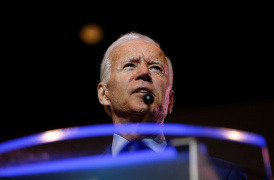






0 notes
Text
%news%
New Post has been published on %http://paulbenedictsgeneralstore.com%
Bbc news Elecciones en Hong Kong: los jóvenes ganadores que derrocaron a los pesos pesados políticos

Bbc news
.spinner-container width:25%; top:20px; left:50%; margin-left:-12.5%; border-radius:8px; position:fixed; text-align:center; box-shadow:0 0 10px rgba(0,0,0,0.24); background:#fff; overflow:hidden; .spinner-container p font-family:'Roboto', Arial, sans-serif; color:rgba(0,0,0,0.87); margin:12px 0 16px 0; padding:0; font-size:12px; .spinner-container img width:22px; height:22px; margin:16px 0 0; padding:0;

Translating...
Image copyright Getty Images
Image caption A file breaking collection of people turned out to vote
Hong Kong's district elections contain delivered an out of the ordinary landslide victory for town's pro-democracy movement, leaving the executive reeling.
For months, teens contain visibly been on the helm of demonstrations, protests and clashes, sparked by a now-withdrawn extradition invoice which morphed into a broader bawl for democracy and police accountability.
These elections noticed many young and newbie candidates decide on political heavyweights - within the determine of Hong Kong's democracy movement - and emerge victorious.
Listed below are four of their reviews.
Bbc news The activist: Jimmy Sham
Image copyright Getty Images
Image caption Jimmy Sham has been attacked twice this three hundred and sixty five days
In the months because the recount movement started, Jimmy Sham has been overwhelmed up twice - by unknown hammer and bat-wielding assailants for causes that also remain unclear.
However the 32-three hundred and sixty five days-extinct chief of the Civil Human Rights Front (CHRF), one in all Hong Kong's largest pro-democracy teams which has organised several fundamental rallies, has emerged one in all essentially the most entertaining winners.
He won his seat within the Lek Yuen constituency by virtually 1,000 votes over the incumbent Michael Wong of the educated-Beijing Civil Force.
Mr Sham would perhaps well need risen to prominence as chief of the CHRF nonetheless he has been an though-provoking LGBT rights campaigner for years and even within the last few months his homosexual identity turned the level of ardour of assaults on him on social media.
Potentially the most most modern bodily assault on Mr Sham in Octoberleft him lying within the aspect toll road and lined in blood. The CHRF linked that assault to executive supporters.
He endured with his vocal marketing campaign and is quoted as announcing after his victory: "No matter how stable Carrie Lam is I hope she will be able to follow the needs of the participants, fulfil the 5 demands [and] give the early life an different."
Bbc news The graduate: Karrine Fu
Image copyright KARRINE FU FACEBOOK
Karrine Fu won her Citadel Avenue constituency by the smallest of margins - factual 59 votes.
The 23-three hundred and sixty five days-extinct was as soon as born and bred within the Fortress Hill design. She is a third-abilities Fujianese Hong Konger - so is section of a neighborhood who came visiting from China's Fujian province and which is identified to be extra conservative and pro-Beijing.
It makes her victory all the extra excellent.
She defeated the incumbent, 45-three hundred and sixty five days-extinct Hung Lin Cham, a secondary college trainer representing the fundamental pro-Beijing Democratic Alliance for the Betterment and Development of Hong Kong (DAB), who won the past three elections without contest.
He's also of Fujianese descent and has held sway over this relatively conservative pro-Beijing stronghold since 2007.
In step with files outlet HK01, Ms Fu, an arts graduate from the University of Hong Kong, decided to bustle within the district elections precisely attributable to the anti-executive protests.
She informed the files outlet that she felt "inspired" to create extra for Hong Kong because the movement. Experiences utter she was as soon as supplied a job in a college nonetheless turned it down attributable to the protests.
Bbc news The student: Jordan Pang
Image copyright Jordan Pang/Fb
Image caption The college chief beat "triple councillor" Horace Cheung
By worthwhile the Sai Wan constituency final evening, a fourth-three hundred and sixty five days politics and public administration student took out one in all essentially the most entertaining political scalps of the election: Horace Cheung.
Mr Cheung is the vice-chairman of the DAB - Hong Kong's largest pro-Beijing party.
Jordan Pang made his determine with his articulacy and passionate advocacy of the protesters' trigger as chief of the Hong Kong University Students' Union.
He defeated Mr Cheung, a 45-three hundred and sixty five days-extinct solicitor who had represented Sai Wan since 2011, by virtually 800 votes: a man who was as soon as identified as a "triple councillor" having held positions within the district council, Legislative Council and Executive Council.
His opponent said the outcomes of the elections were "no longer worthy to create with local district work".
In an announcement on Fb, Mr Pang said he was as soon as "humbled" by the victory nonetheless added that there was as soon as "aloof a long aspect toll road ahead".
The 21-three hundred and sixty five days-extinct is one in all several high-profile student leaders who contain received threatening nameless messages. Mr Pang said he was as soon as informed to quit to the police, or face death - nonetheless he continued with his marketing campaign.
"The victory on the present time and file-shattering turnout charge displays precisely the articulate of the participants amidst this serious predicament," he informed supporters.
Bbc news The compliance officer: Cary Lo
Image copyright Getty Images
Image caption Cary Lo of the Democratic Birthday celebration won by around 1,200 votes
In what is being mighty as presumably essentially the most sudden victory by pro-democracy activists, Cary Lo of the Democratic Birthday celebration unseated pro-Beijing flesh presser Junius Ho.
The 37-three hundred and sixty five days-extinct compliance officer beat Mr Ho - one in all town's most controversial politicians - by around 1,200 votes within the Lok Tsui constituency.
Mr Ho, a 57-three hundred and sixty five days-extinct prison educated, turned a member of Hong Kong's Legislative Council in 2016 and so he remains a lawmaker.
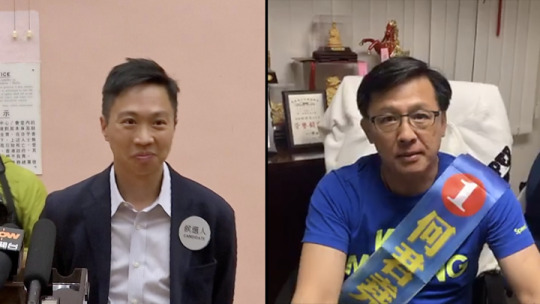
Media playback is unsupported on your tool
Media captionA winner and a loser in Hong Kong's historic pollresult
But he has as we disclose turn into a abhor-figure among pro-democracy activists, who accused him of helping orchestrate an assault on activists and passers-by within the district of Yuen Prolonged.
He denies such hyperlinks nonetheless the infuriate endured and earlier this month he was as soon as stabbed whereas campaigning by a man who pretended to be one in all his supporters.
After the outcomes came out, footage of crowds it sounds as if cheering his defeat were circulated on social media.
"I am moved, the opposition overwhelmed me with congratulations," said Mr Ho on social media. "It will not be any longer a inappropriate things to remodel their brutality to team spirit."
As far because the man who defeated him goes, his Fb marketing campaign internet page aspects footage of him jogging along Hong Kong's waterfront amid pleasant exchanges with residents.
For all his marketing campaign crafty, many analysts would argue that simply being another option to Junius Ho was as soon as Cary Lo's fundamental relieve.
function gtElInit() var lib=new google.translate.TranslateService(); lib.setCheckVisibility(false); lib.translatePage('en', 'es', function (progress, done, error) error) document.getElementById("gt-dt-spinner").style.display="none"; );
0 notes
Text
HK protesters march, withdraw money from Bank of China
HK protesters march, withdraw money from Bank of China
Hong Kong protesters on Saturday continued through different means to oppose the controversial extradition legislation, despite Chief Executive Carrie Lam Cheng Yuet-ngor’s Tuesday description of the bill as “dead.”
On Saturday evening, hundreds of armed police were deployed to disperse the protesters in Sheung Shui with their batons and long shields after thousands of protesters ended a march at 5pm. Police also used pepper sprays against the protesters.
North District Parallel Imports Concern Group, established in 2012 to monitor how Hong Kong’s North District was affected by the incoming Chinese tourists and individual traders, was to hold a march titled “Recover Sheung Shui” in the North District Sports Ground in New Territories from 3:30pm on Saturday. It expected about 2,000 people would join the march.
Apart from the main theme of opposing the extradition bill, the group also calls for the government to curb parallel trading activities, which it said seriously affect the livelihood of local residents in Sheung Shui and Tai Po.
Organisers ended the march at about 5pm. They said a total of 30,000 people had joined the march while the police said there were 4,000 at its peak.
After the march, thousands of protesters occupied Sun Wan Road in front of Landmark North, a shopping mall opposite to the Sheung Shui MTR station. Some protesters were staying on Lung Sum Avenue and Lung Wan Street.
Armed police started dispersing the crowd from 6pm, RTHK reported. At 8pm, more armed police arrived while a lot of protesters decided to go home as they planned to join the anti-extradition march in Shatin in New Territories on Sunday.
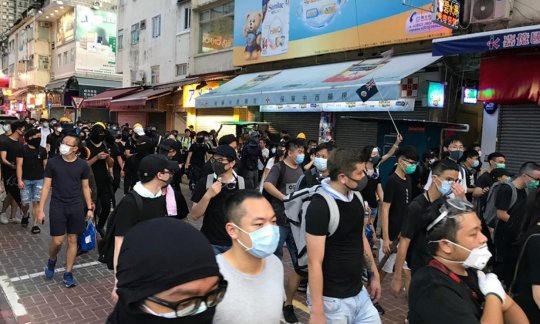
After the march ended at 5pm, masked protesters continue to gather on streets in Sheung Shui. Photo: RTHK
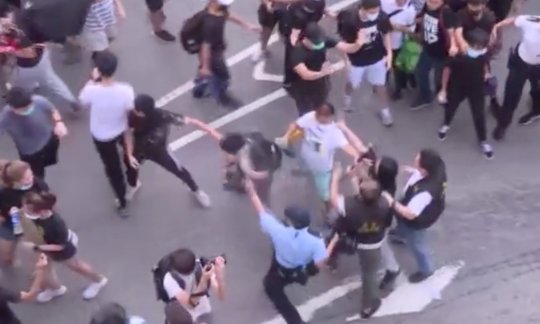
Armed police try to disperse the crowd. Photo: RTHK
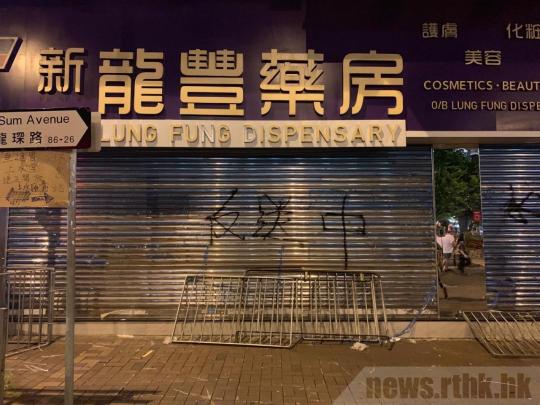
Some shops are damaged. Photo: RTHK
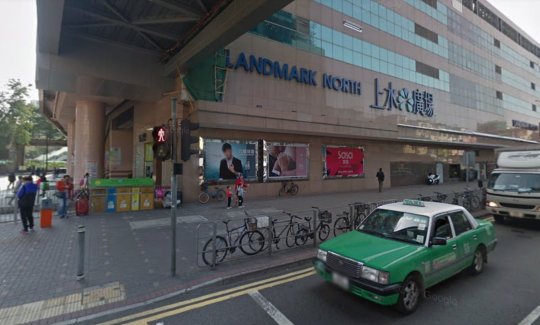
Parallel trading activities – a bonus issue for some multitaskers who have protested against the extradition bill – are active in Shek Wu Hui in Sheung Shui in New Territories. Photo: Google Maps
Parallel imports to Hong Kong from the mainland are not pirated or counterfeited goods; they have been manufactured by – or under the authority of – whoever owns the intellectual property rights. Rather, the dispute focuses on the grievances of Hong Kong business persons who object to competition by parallel importers.
“There is no universal consensus on the legal issue relating to parallel importation, and whether it should be restricted is a controversial issue with endless debates,” says HG.org, a specialist legal publication.
As the day’s activities revealed, multitasking Hongkongers have begun to use the protests to agitate on other issues they have with the mainland, whether closely related to extradition or not.
Queues were seen at certain branches of the Bank of China (Hong Kong) in the morning after netizens called for a money-withdrawal campaign to stress-test the cash storage situation of the Chinese bank.
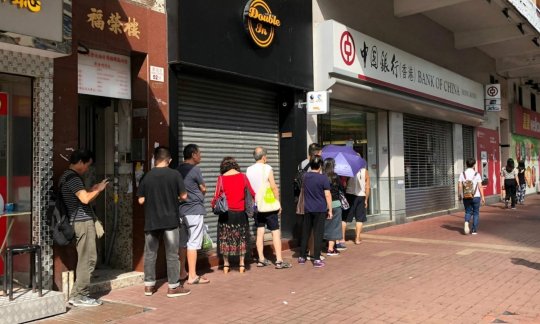
A queue was seen out side the Tai Po branch of the Bank of China. Photo: RTHK
Since last week, netizens have been promoting the campaign as a way to urge the Hong Kong government to “withdraw,” not only suspend, the extradition bill. They also called for the retraction of “riot” characterization of the June 12 protest, the release of the arrested anti-extradition protesters, the establishment of an independent commission to investigate the police brutality and Lam’s resignation.
Over the past week, an online poster had been circulated, saying that Hong Kong citizens should avoid depositing money in the Bank of China as the bank is facing the risks of cash shortage due to non-performing loan problems in China. The poster said the warning was issued by the Hong Kong Monetary Authority (HKMA).
On Thursday, HKMA said in a statement that such online claims are “untrue and totally unfounded.” It said the warning was falsely attributed to the HKMA. It urged the public to be discerning when dealing with online information.
On Friday, netizens said on discussion groups that the Bank of China had taken the abnormal precaution of ordering all staff to work on Saturday.
An unnamed Bank of China staff member told the Hong Kong Economic Journal that the bank’s staffers were verbally told by their supervisors to work on Saturday. Citing bank staff members, Ming Pao reported that the Bank of China increased manpower on Saturday for the launch of “silver bonds,” which target elderly customers. The report said some staff were relocated to the branches in Sheung Shui in New Territories, where protests would be staged in the afternoon.
Bank of China’s spokespersons did not respond to media enquiries.
Read: HK protesters moot Bank of China ‘stress test’ after latest clashes
Read: HSBC cashes in on growing anti-BoC sentiment
According to Radio Television Hong Kong, some customers were seen queuing up in the Tai Po branch of the Chinese bank in the morning but not in many other branches such as in Sham Shui Po and Sheung Shui. Other media reports said some police took pictures at some of the bank’s branches.
In another case of protesters’ mixed motives, on July 6 local groups called for a “Recover Tuen Man” march to oppose the extradition law – as well as “indecent” singers in Tuen Mun Park. These singers, who came from mainland China, with some of them being new immigrants, were seen dancing in short shirts in the entertainment area of the park in order to get money tips from elderly local men.
Accused of making too much noise, the women were reportedly backed by some profit-making organizers. Local pressure groups had been complaining about the situation for more than decade but failed to make any change.
Despite some clashes in the crowd, the latest “Recover Tuen Man” protest was called successful as the District Council on Tuesday passed a motion to stop providing an entertainment area in the park.
Read: Residents rally against HK’s ‘Singing Aunties’
The anti-extradition law protests have extended to different districts in Hong Kong as protesters set up “Lennon Walls” in public areas to express their opinions. However, some volunteers who helped monitor the walls were attacked by local residents in some districts, including Yau Tong and Tai Po.
Starry Lee Wai-king, chairperson of the Democratic Alliance for the Betterment and Progress of Hong Kong, which is a pro-Beijing political group, said posting memo papers on public walls is illegal but people with different views should stay calm.
Read: Retired HK cops held for allegedly assaulting protesters
Read: More clashes break out at ‘Lennon Walls’ in HK
On the afternoon of July 7, anti-extradition protesters marched from Tsim Sha Tsui to the Hong Kong West Kowloon Station – the terminus for high-speed trains to Guangzhou and Shenzhen. Organizers said more than 230,000 people took part in the protest, while police said up to 56,000 attended in Kowloon.
The march was aimed to tell the mainland shoppers in Tsim She Tsui about the anti-extradition campaign. After the march ended in the evening, protesters walked to Mongkok, occupied key roads and held a late-night standoff with the police in the district.
Police dispersed the protesters with batons and shields with some people suffering head injuries and bleeding. The police were slammed for using excessive force at protestors and journalists.
Read: Bloody clashes after latest rally in Hong Kong
Read: Citizens planning protests in HK’s 18 districts
On Friday evening, hundreds of students gathered at Sun Yat-sen Place on the campus of the University of Hong Kong to oppose the extradition bill. They said they were disappointed by the statement previously issued by Zhang Xiang, Vice Chancellor and President of the University of Hong Kong, who condemned protesters for storming the Legislative Council on July 1.
They then went to Zhang’s apartment. Zhang came out and talked to them for 40 minutes. Zhang reiterated his anti-violence stance but promised that he would not allow police to arrest students in the campus without court orders.
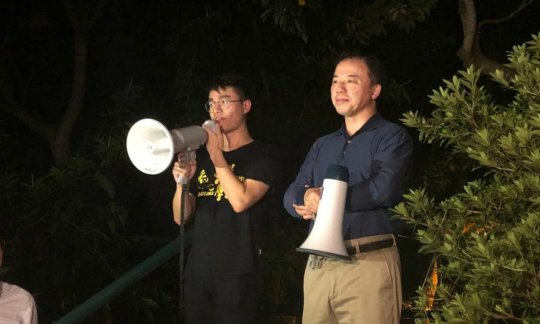
Zhang Xiang (right), Vice Chancellor and President of the University of Hong Kong, talks to the students. Photo: RTHK
Published at
How has war affected Syria’s oil and gas sector?
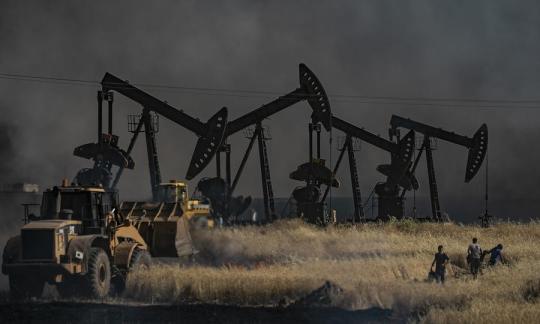
Syria’s eight-year war has seen the Damascus regime lose control of key oil fields and caused state hydrocarbon revenues to plummet by billions of dollars.
Weak production has forced President Bashar al-Assad’s regime to import oil, but Western sanctions on Damascus and Tehran are hampering incoming tankers.
Here’s an overview:
Who controls what?
In 2013, Syria’s oil reserves were estimated at 2.5 billion barrels, and gas supplies at 241 billion cubic meters (8.5 trillion cubic feet).
Control of these is split between the regime and the Kurdish-led Syrian Democratic Forces who have been fighting the Islamic State group.
The US-backed SDF control Syria’s largest oil field in Al-Omar in the eastern province of Deir Ezzor, as well as the nearby Tanak and Jafra fields.
They also hold the Rmeilan field in the northeastern province of Hassakeh, as well as other smaller ones there and in the northern province of Raqa.
The Russia-backed regime, meanwhile, holds the country’s largest gas field in Shaer, as well as those of Sadad and Arak.
It also controls some oil fields in Deir Ezzor, Raqa, and the central province of Homs.
What’s the damage?
Before the war, oil and gas were key to the country’s economy.
In 2010, they contributed about 35 percent of export earnings and 20 percent of state revenue, the Syria Report economic publication says.
After war broke out in 2011, production plummeted as fighting and bombardment destroyed infrastructure, and the government lost control of its largest fields.
International oil companies suspended activities, including to comply with Western sanctions on the regime.
Up to $74.2 billion in revenue has been lost in the war, Oil and Mineral Resources Minister Ali Ghanem has said.
Crude oil production plunged more than 99 percent between 2010 and 2016, from 385,000 barrels per day to just 2,000, according to figures provided by Ghanem in April.
Natural gas production fell 69 percent from 21 million cubic meters per day to just 6.5 million over the same period.
But since the regime took back Homs oil and gas fields from IS jihadists in 2017, production has increased to 24,000 bpd for oil and 17 million cubic meters for gas, according to the minister.
But this is just 20 percent of Syria’s oil needs, and between 60 and 70 percent of its gas requirements.
Are sanctions biting?
After production plummeted Damascus had to resort to importing hydrocarbons to fulfill its needs.
The Syrian government turned to ally Iran, who opened up a credit line to supply it with oil.
But Western sanctions on oil shipping, as well as US punitive measures against Iran, have complicated imports.
In November, Washington slapped fresh sanctions on Tehran, accusing it of creating a complex web of Russian cut-out companies and Syrian intermediaries to ship oil to Damascus.
From October 2018 to the start of May this year, no oil tanker reached Syria, pro-regime Al-Watan newspaper has reported.
A fuel and gas crisis hit regime-held areas this winter and spring, causing the government to take austerity measures.
Damascus also accuses Egypt of having closed the key Suez Canal shipping lane to vessels heading to Syria.
Last week, Britain detained a tanker carrying Iranian oil on suspicions it was heading to Syria, but Tehran on Sunday denied that was its final destination.
Last month, Damascus accused an unnamed foreign entity of “sabotage” of underwater pipelines to its Banyas oil refinery on the Mediterranean.
What options for Damascus?
With the country’s most important oil fields in the far east still out of reach, Damascus faces two options: strike a deal with the SDF, or military reconquest.
The Kurdish-led forces have in the past insisted that any deal with the regime would have to ensure an equal sharing out of oil and gas.
Before the war, crude extracted in the east was transferred to either Homs or Banyas to be refined, whereas Syria’s Kurds only have small refineries designed to meet just local needs.
Yet the regime taking back military control of the eastern oil fields would allow Syria to be self-sufficient in all petroleum products, according to the oil minister.
During the conflict the regime has bought oil from Kurdish and IS-held areas to secure part of its needs, several sources have said.
Analysts say revenues from the oil and gas sectors are likely to be key in rebuilding Syria should a peace deal be struck and sanctions lifted so exports can resume.
Read the full article
0 notes
Text
HK civic leaders make urgent call for anti-mask law
HK civic leaders make urgent call for anti-mask law
ศาสตร์เกษตรดินปุ๋ย : ขอบคุณแหล่งข้อมูล : หนังสือพิมพ์ The Nation
https://www.nationthailand.com/news/30377052
HK civic leaders make urgent call for anti-mask law International Oct 04. 2019
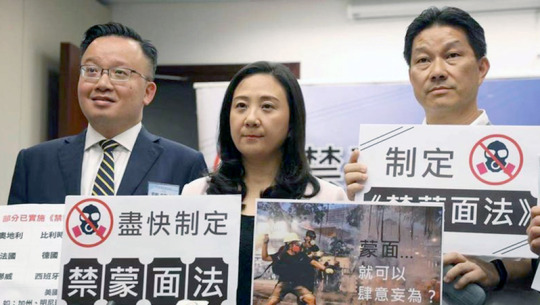
Elizabeth Quat Pui-fan from the Democratic Alliance for the Betterment and Progress of Hong Kong joins a cross-sector concern group on Thursday, calling for anti-mask law to deter the rampant masked rioters…
View On WordPress
0 notes
Text
Politics over public health: how the coronavirus outbreak is adding fuel to anti-government sentiment in Hong Kong
See on Scoop.it - COMPARE RISK COMMUNICATION
12 February 2020 Politics over public health: how the coronavirus outbreak is adding fuel to anti-government sentiment in Hong Kong The coronavirus outbreak has triggered a growing sense of dissatisfaction among Hong Kongers, which is steadily intensifying an already-existing anti-government and anti-China narrative in the territory. A month into the emergence in China’s Wuhan of a novel coronavirus outbreak (2019-nCoV), the number of cases and fatalities continue to rise rapidly and the infection has spread to several countries in Asia and Europe, including the Philippines, Japan, Thailand, Germany and France. The outbreak has, however, elicited a particularly complex response in China’s special administrative region of Hong Kong. Here, there is a growing sense of dissatisfaction triggered by the outbreak, which is intensifying an already-existing anti-government and anti-China sentiment. With at least 18 confirmed cases of the novel coronavirus, including one fatality, reported across the territory as of 6 February, Hong Kongers have begun to express discontent at the perceived inefficiency of the authorities in handling the crisis. Medical workers launched an indefinite strike on 3 February demanding that the government completely close down all border crossings with mainland China. According to a poll by the Hong Kong Public Opinion Research Institute, 80 per cent of Hong Kongers support this demand as the medical system would be unable to handle a full-blown outbreak. Chief Executive Carrie Lam has however been reluctant to take drastic public health measures for fear of treading on politically sensitive ground, claiming that such a move would be inappropriate, impractical and discriminatory. Despite most of the links with the mainland being gradually shut down, thousands of people are still entering Hong Kong from the three most important entry points which remain open, thus increasing the risk of further spreading of the disease. People are displeased with the government for its over-compliance and appeasement policies toward Beijing despite an ongoing crisis. Distrust and uncertainty loom large over the citizens who are standing in long queues to procure essentials, particularly face masks which are in shortage. Residents have also staged protests against government plans to set up quarantine centres in their neighbourhoods. Additionally, the economy, which was already reeling under the pressure of prolonged anti-government protests, is forecast to take a further hit. Hong Kong Financial Secretary Paul Chen remarked that the virus "will greatly increase the risk of continued economic contraction this year"; Goldman Sachs reduced its forecast for Hong Kong’s economic growth in the first quarter from 5.6 percent to 4 percent owing to the impact of the outbreak on tourism, retail, hospitality and food and beverage industries. Tourism is expected to be particularly affected as several countries, including the Philippines and Italy, have included Hong Kong in their travel restrictions against China. These factors are compounding an existing anti-government sentiment which was triggered in mid-2019 during mass protests against a proposed extradition bill. The movement quickly turned into demands for Carrie Lam’s resignation and democratic reforms. While the 2019 protests saw a clear division between pro- and anti-government camps, the coronavirus outbreak has seen rising dissatisfaction from people across the political divide; even pro-Beijing parties (Democratic Alliance for the Betterment and Progress of Hong Kong as well as the Liberal Party) have issued statements calling for the immediate closure of the border, piling pressure on the government to “take decisive and strict measures”. The situation currently unravelling in Hong Kong is in part reminiscent of the 2003 SARS outbreak where the nation was embroiled in a political crisis and a public health emergency simultaneously. Mass protests against the national security legislation coupled with the SARS outbreak and an economic decline triggered a governance crisis which eventually led the-then chief executive Tung Chee-hwa to resign. Similar upheavals cannot be ruled out in the current situation; rising public angst will certainly not bode well for the pro-Beijing camp in the upcoming Legislative Council elections in September. With the death toll rising sharply in mainland China, the outbreak is on a clear trajectory towards worsening as the Hong Kong government struggles to balance between catering to public demands and meeting China’s expectations in the backdrop of an already-existing anti-government sentiment.
0 notes
Photo
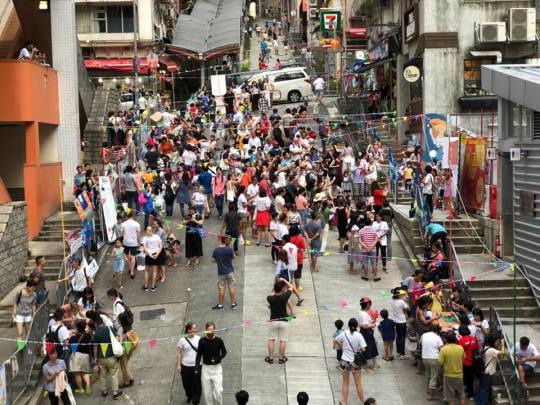
Hong Kong gov’t blocks efforts by pro-democracy district councillors to hold Lunar New Year fairs
"The Hong Kong government has banned several Lunar New Year fairs hosted by pro-democracy district councillors.
The government has announced a ban on dry goods, including political satire items, at Lunar New Year fairs citing public safety concerns. Several district groups had tried to host their own fairs ahead of new year’s day next Saturday.
Some members of the pro-Beijing Democratic Alliance for the Betterment and Progress of Hong Kong party, who lost the November election, have accused pro-democracy councillors of “serving their political stance” by using their powers to host and sponsor new year fairs."
Credit to the source
0 notes